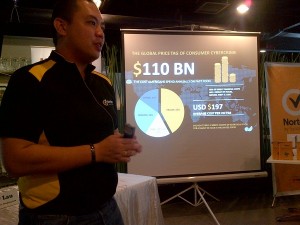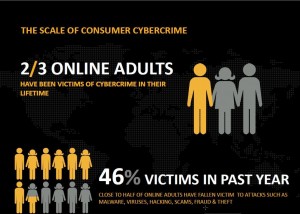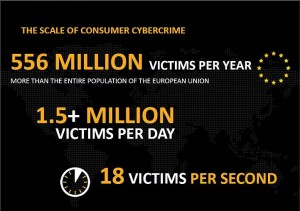Over 1.5M are cybercrime victims daily worldwide–study

Jason Mok, Norton By Symantec Consumer Sales Manager, presents the 2012 Norton Cybercrime Report which finds that cybercrimes being committed on mobile devices and social networks are on the rise. MATIKAS SANTOS
MANILA, Philippines — Cybercrime committed in mobile devices and social networks are fast rising and a vast majority of people may already have been a victim without their knowledge, according to an annual study of Norton by Symantec, an international computer security company.
Norton released in the Philippines the findings of their 2012 Norton Cybercrime Report (NCR) Thursday that found that 18 people fall victim to cybercrime every second “resulting in more than 1.5 million cybercrime victims each day on a global level.”
“In the past twelve months, an estimated 556 million adults across the world experienced cybercrime, more than the entire population of the European Union,” the study said.
The report also found that netizens are not aware they may already have become a victim of cybercrime because of the way malware, such as viruses, behave on a computer or mobile device through the years.
‘Cybercriminals are changing their tactics to target fast growing mobile platforms and social networks…‘
– Study
“Forty percent of adults do not know that malware can operate in a discreet fashion, making it hard to know if a computer has been compromised, and more than half or 55 percent are not certain that their computer is currently clean and free of viruses,” the study said.
“Malware and viruses used to wreak obvious havoc on your computer,” Marian Merritt, Norton Internet Safety Advocate in a statement from Norton. “You’d get a blue screen, or your computer would crash, alerting you to an infection.”
Cybercriminals have changed their methods and are now instead using discreet ways to get important information from people to try to scam money from other victims, he said.
“This year’s results show that nearly half of Internet users believe that unless their computer crashes or malfunctions, they’re not 100 percent sure they’ve fallen victim to such an attack,” the study said.
New Cybercrime Forms
The 2012 NCR, which was previously released in the United States (US), also found that new forms of cybercrime, such as those committed through mobile devices and social networks, are on the rise.
“Cybercriminals are changing their tactics to target fast growing mobile platforms and social networks where consumers are less aware of security risks,” the study said.
“One in five online adults or 21 percent has been a victim of either social or mobile cybercrime, and 39 percent of social network users have been victims of social cybercrime,” the study said.
Social networks are becoming a prime target of cybercrime such as identity theft, hacking, and scams, Jason Mok, Norton By Symantec Consumer Sales Manager of Bangladesh, Indonesia, Philippines and Thailand, said in a presentation.
“Fifteen percent of social network users reported someone had hacked into their profile and pretended to be them. One in 10 social network users said they’d fallen victim to a scam or fake link on social network platforms,” the study said.
Despite the widespread perception of many netizens about cybercrime, not all take steps to secure their information online, it added.
“While 75 percent believe that cybercriminals are setting their sights on social networks, less than half or 44 percent actually use a security solution which protects them from social network threats and only 49 percent use the privacy settings to control what information they share, and with whom,” the study said.
People’s mobile devices were also being used to lure unsuspecting victims to get their money, Mok said.
“Nearly one-third or 31 percent of mobile users received a text message from someone they didn’t know requesting that they click on an embedded link or dial an unknown number to retrieve a “voicemail”, the study said.
Among the activities that can be classified as cybercrime are computer viruses and malicious software infecting computers, fake and spam emails, online harassment and cyberbullying, identity theft and hacking of personal accounts, credit card theft, among others.
Cybercrimes being conducted on social networks were bullying, fake links and scams, messages or sites that try to get personal information also known as phishing, etc.

Direct costs of cybercrime worldwide are at $110 billion over the past 12 months, the study said.
The most number of cybercrime victims are in Russia with 92 percent, while 84 percent are in China and 80 percent in South Africa, the study said.
The study however found that people were conscious of online threats. It said that 89 percent of people delete suspicious emails from people they don’t know, 83 percent have a basic antivirus solution, and 78 percent do not open attachments or click links from unsolicited emails.
The study surveyed 13,000 adults aged 18 to 64 across 24 countries (Australia, Brazil, Canada, China, Colombia, Denmark, France, Germany, India, Italy, Japan, Mexico, Netherlands, New Zealand, Poland, Russia, Saudi Arabia, Singapore, South Africa, Sweden, Turkey, UAE, UK, USA).
